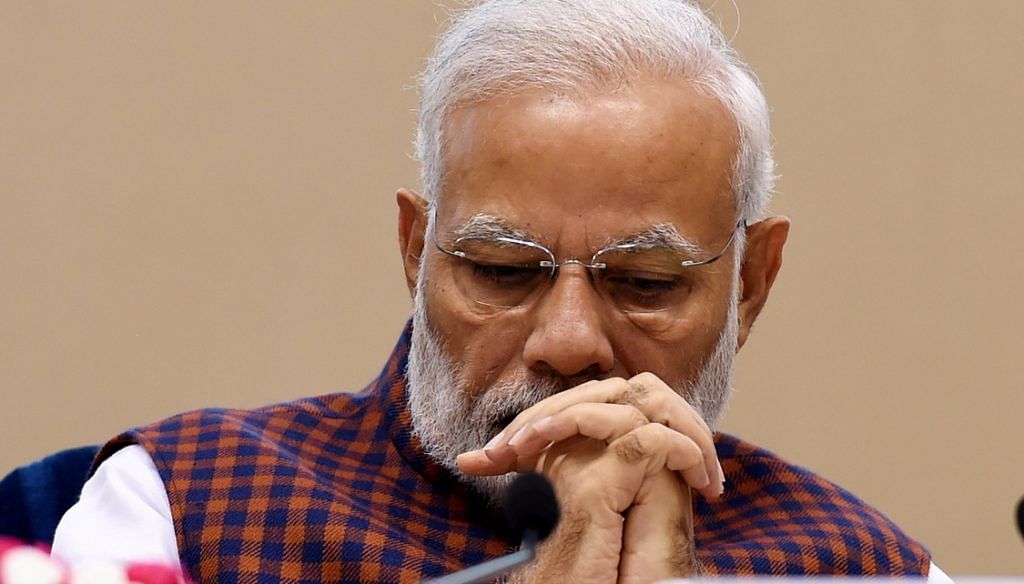In Prime Minister Narendra Modi’s first term, he went back on one of his first efforts. That first effort was to amend the land acquisition law for industries. That move is counted even today as a rare moment when Congress leader Rahul Gandhi managed to get the better of the Bharatiya Janata Party government. Gandhi had famously opposed the move calling Modi’s a “suit-boot sarkar” — a government working for the interests of corporate India and not the masses.
In his second term, Modi has already had two similar setbacks, but he has astutely managed the perception of both in such a way that they don’t look like setbacks. They don’t look like Modi ate humble pie. Looking weak or appearing to cower under pressure, that’s the last thing Modi wants to do.
Appearing for one of the petitioners in the farm laws case, senior advocate Harish Salve responded to the Supreme Court’s proposal to halt the implementation of the farm laws. He said the halt shouldn’t be seen as a “political victory”, and that the protesters shouldn’t feel they have “won this round”.
That’s an odd thing to say in a courtroom, but given the times we live in, we are not surprised to see people caring more about perception than reality. Salve seems to be less worried about the suspension of farm laws and more worried that doing so would be seen as a “victory” by India’s farmers. That means it would look like a loss of face for the government.
Let us not fall for this perception management. The reality is that the farm laws are not becoming a reality anytime soon. The government has now added to the Supreme Court’s order and said it is willing to suspend the implementation for 1.5 years.
The reason why this doesn’t look like a setback for the government is because the laws aren’t being repealed. They won’t be taken back. The government can say, politically, it did not surrender before the protesters’ demand of a complete repeal of the laws. Both sides can have a face-saver, though the farmers are playing tough even in this arrangement.
A face-saving exit is an exit nonetheless. The fact of the matter is that we are not going to see Agricultural Produce Market Committee (APMC) mandis disrupted by the new farm laws, and we are not going to see the arhatiyas being deprived of their commissions. If the government’s intent was to make the APMC mandis unviable overnight, or to privatise agricultural marketing overnight, it’s not happening. At least not in 2021. At least not till the Punjab assembly election in February-March 2022. And then the Lok Sabha election will be too close to light the fires again. This bird seems to be headed towards extinction, whether you call it Dragon Fruit or Kamalam is inconsequential.
Also read: Can India actually afford MSP for farmers? It’s a question of political will
What’s a vaccine got to do with CAA rules?
Similarly, the Citizenship (Amendment) Act of 2019 has gone out of the political discourse. It’s very much a law. As is the law that needs the National Population Register (NPR) to be updated. Covid has halted not just the NPR but even the Census.
When protests against NRC-NPR-CAA “chronology” laws started in 2019, the government pretended it never had any intentions to carry out an all-India citizenship-verification exercise or the National Register of Citizens (NRC). So they went back on the NRC right away. But now they seem to have gone back on CAA as well, albeit in a way that doesn’t look like they have gone back on it. Like the farm laws, the CAA will remain a law. It won’t be, doesn’t have to be, removed from the statute books just because the government won’t release the rules to operationalise the law.
So, theoretically, the government can bring in the CAA rules any morning. The NPR-NRC-CAA chronology was supposed to be about the Assam and West Bengal elections, which are due in April. Results will be out in May.
Home minister Amit Shah said in December, “The rules of the CAA are yet to be framed as such a massive process could not be carried out because of the corona. As soon as (COVID) vaccination starts and corona cycle breaks, we will consider it.”
The CAA merely gives citizenship to some non-citizens. If something as massive as privatisation of agriculture can be done with ordinances and laws pushed through Parliament with a controversial voice vote despite the pandemic, it is strange that something as simple as CAA rules can’t be issued.
Even though the government and the BJP have completely stopped talking about NPR-NRC-CAA, activist groups in Assam are still protesting about it. Despite the riots that dissipated anti-CAA protests in East Delhi, it was only the Covid-19 pandemic that really ended the protests. If CAA rules were issued, it is unlikely that those who had apprehensions about the law will not have apprehensions anymore.
Most likely, the CAA is now history. It won’t be removed, but we won’t see the rules for some years. If the BJP wins Assam, it will for the moment have to forget all about the NRC and CAA. It will make noise about the NRC in Assam only till the elections.
Also read: Punjab farmers will vote for us in Feb polls because of the farm laws — BJP’s state in-charge
Protesting works
The big takeaway from both instances, of course, is that if there is one thing that works it is public protest. Parliament, opposition, media, judiciary — none of the institutions today act as a check and balance on unbridled executive power. This is why protest — peaceful protest — is so central to democracy, and this is why protesters are identified and slapped with so many cases under the most draconian of laws.
Shivam Vij is a contributing editor at ThePrint. Views are personal.
